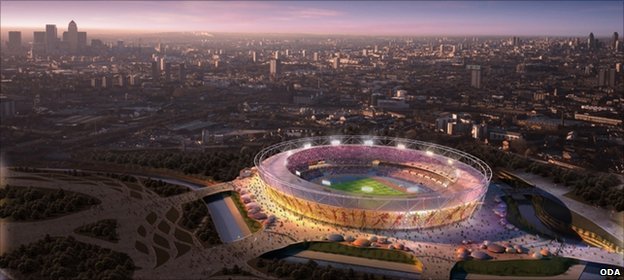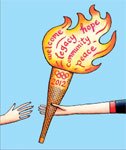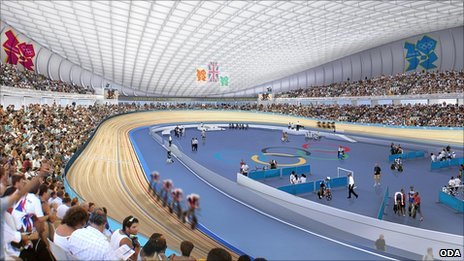The Church and the 2012 games
With a year to go before the London Olympic Games, the Catholic Church’s plan to provide spiritual and practical support to spectators and athletes alike is well advanced. But there are even more ambitious plans to promote peace and build a new sports club in every parish
The year-long countdown to the London Olympics has begun and the final pieces of the vast infrastructural jigsaw behind the event are being eased into place.

The triangular floodlights of the new athletics stadium already loom large over the east London skyline, while other venues and apartment buildings near completion on the massive Olympics site in Stratford like giant blocks of Lego. The building work – together with the accompanying multi-million-pound upgrade of Stratford station and construction of a new Westfield shopping centre – are transforming a once bleak landscape into a vision of modernity.
The London Olympics and Paralympics will bring an unprecedented injection of money and jobs into surrounding boroughs, with hundreds of thousands of spectators, 10,500 athletes and 20,000 journalists arriving from around the world. But although this influx presents undoubted economic and social opportunities, it also brings with it a darker side, with criminals expected to exploit an increase in demand for such “services” as prostitution and drugs while other issues, such as drink-related disorder and increased homelessness – caused by those who arrive without a place to stay –also pose a significant challenge for the authorities.
While the Metropolitan Police and east London’s local authorities are responsible for cracking down on crime and social problems linked to the Olympics, voluntary organisations, including the Catholic Church, are to play a key role in providing spiritual and pastoral support. From raising awareness of sex trafficking to stationing thousands of “games pastors” at transport hubs to offer advice to disorientated travellers, the Church has spent the past two years honing the role it will play during the event.
As head of the Catholic 2012 Committee, Mgr John Armitage, vicar general in the Diocese of Brentwood, which covers east London and Essex, is organising a team of more than 20 chaplains to provide 24-hour pastoral care for competitors stationed in the Olympic Village. I caught up with him at the Catholic-run Anchor House homeless hostel in Canning Town, within sight of the Olympic Village, to find out more about his work.
 A native East-Ender, Mgr Armitage, 56, was a “decent sprinter” in his youth, and has needed all of his energy during the past two years to plan the role to be played by his chaplains in helping the world’s best athletes to cope with the pressure of top-level competition during the Olympics and Paralympics.
A native East-Ender, Mgr Armitage, 56, was a “decent sprinter” in his youth, and has needed all of his energy during the past two years to plan the role to be played by his chaplains in helping the world’s best athletes to cope with the pressure of top-level competition during the Olympics and Paralympics.
“There will be thousands of young people coming from all over the world for the Olympics, most of whom will be hoping to win – most will not,” said Mgr Armitage. “So there is that side of things to look after, together with other issues. A chaplain will always be available. They will have plenty to do. Around two-thirds of the 23,000 athletes and media who are attending are expected to be Christian, and half of those will be Catholic, so there will be a big demand for chaplaincy.”
The Church will also provide two hospitality centres catering for the spiritual and pastoral needs of spectators, one of which is to be based in the Olympic Village and the other at Westminster Cathedral in central London, while a 24-hour exposition of the Blessed Sacrament will be held at the Church of St Francis in Stratford throughout the event.
Together with the chaplaincy service, the Church is also seeking to extend the reach of its message by taking part in ecumenical pastoral work as part of the More Than Gold initiative, which aims to get the different Christian denominations involved in the games. Sitting alongside Mgr Armitage was James Parker, Catholic executive coordinator for the 2012 Olympics and Paralympics, who is leading preparations for the Church’s role in the More Than Gold scheme.
Mr Parker believes the games present a unique opportunity for the Catholic community to spotlight its message on social justice and other issues. He explained: “Parishes have also been encouraged to sign up to the More Than Gold project by providing a representative, or Gold Champion, to volunteer during the games. This person would act as the go-between between churches or schools and More Than Gold.”
Perhaps the Church’s most important role, before and during the games, will be helping to address the impact of people trafficking, particularly of women, but also of men, involved in the sex industry. At the Athens Olympics in 2000, for example, sex trafficking almost doubled. A small increase in the number of trafficked women working as prostitutes has already been noted in the five London Olympic host boroughs, and been linked, in part, to the large number of workers on the Olympic Park site.
Meanwhile, the Metropolitan Police have trained officers to identify women forced to work in the sex industry. A special police team is to work with immigration officials to target those involved in people trafficking, while priests have already been encouraged by the Church to raise awareness of the problem among their congregations.
Detective Inspector Kevin Hyland, head of the Metropolitan Police’s People Trafficking and Prostitution Unit, visited the headquarters of the Catholic Bishops’ Conference of England and Wales in May where he urged Catholics to play their part in tackling the problem.
“This is something that should be on the Church’s agenda for the build-up and during the Olympic Games,” said Mr Hyland. “I know there are plans to set up centres to support victims of trafficking. The Church can play a fundamental role in supporting victims during the games.”

The Church plans to send officials to countries affected by trafficking to work with senior clergy to try to educate potential victims about the risks they face. It also supports the work of the Medaille Trust – a Catholic-founded organisation that provides advice and safe accommodation for trafficked men, women and children in London and across the United Kingdom.
“Making people, particularly young people, aware of this is a big part of the battle,” said Mr Parker, who added that the Church is also planning to use the games to increase its support for environmental issues, explaining: “We will be encouraging the use of fair trade goods during the event and the use of ethically sourced fabrics in clothing worn by athletes and officials.”
Catholics will be encouraged to open their homes to athletes’ families from poorer countries who cannot afford hotel or bed-and- breakfast accommodation, through an initiative called Athletes Family Homestay. The scheme, which is part of the More Than Gold initiative, will involve picking up and welcoming athletes’ relatives from a hospitality centre, providing them with bed-and-breakfast for eight days, as well as acting as hosts to their foreign guests and dropping them off at a transportation hub each day.
“We do not want to see people made homeless because of the games,” said Mr Parker. “This is about Christian hospitality.”
Catholic hospitality will also be offered to 1,200 young people aged 18 years and above at a special “Joshua Camp” being run by the missionary Sion Community at its base in Brentwood, Essex, during August. Campers will be encouraged to support those attending the games, by such activities as serving at hospitality centres, sports missions and mounting events for children and young people.
The threat of gang violence is to be addressed with the launch of a 100-Day Olympic Truce in the capital, with the Church urging schools to run sporting and cultural events to bring youngsters from different parts of the metropolis together to engage in safe competition rather than fighting each other. The truce will be marked 50 days before the games begin with a special Saturday celebration in Trafalgar Square on 9 June 2012.
“School communities are being invited to engage with the truce on or around 8 June,” said Mr Parker. “We are engaging with as many aspects of civil society as possible to mark the truce 50 days before the games begin with this special celebration in Trafalgar Square. It is important that the Church, which can often be seen as irrelevant by many, is not only a part of the party but wherever possible is seen to be its host.”
As part of the promised “Olympic Legacy”, the Church is to create new sports clubs in parishes across the country through the John Paul II Foundation for Sport. The scheme was announced by Pope Benedict XVI during his visit to Britain last September and will take up the motto of the truce – “Peace Through Sport”.
Mgr Vladimir Felzmann, Catholic chaplain to Canary Wharf in Docklands and Westminster diocesan coordinator of school chaplains, has been the driving force behind The John Paul II Foundation. As well as his other roles, Fr Vlad, as he is known, was recently appointed Catholic Chaplain for Sport by Archbishop Vincent Nichols and quotes Pope Benedict: “Sport can walk hand in hand with faith.”
Fr Vlad explains: “This is a message we want to build on, during and after the Olympics. The idea is that these sports groups will foster the growth of inner peace, respect for others, self-control and cooperation between young people, who might otherwise have only known how to revert to violence against others. It’s the transformation of ‘Truce to Peace’ that is urgently needed. Parish-based sports clubs will have the benefit of helping young people to connect with the Church when they might not have done otherwise. It is a great opportunity.”
Fr Vlad acknowledges the huge task he faces, but is confident of building support for the Church’s work to increase access to sport in different communities “so as to transform the shape of our society”.


 Votes : 0
Votes : 0









